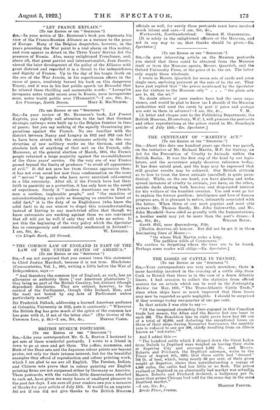"THE COMMON LAW OF ENGLAND IS PART OF THE LAW
OF THE UNITED STATES OF AMERICA." (To THE EDITOR OF THE "SPECTATOR."]
Sra,—I am not surprised that you cannot trace this statement to Chief Justice Marshall, because it is not true. Blackstone (Commentaries, Vol. I., 108), writing a little before the War of Independence, says :— " And therefore the common law of England, as such, has no allowance or authority there [` our American plantations'] they they being no part of the Mother Country, but distinct (though dependent) dominions. They are subject, however, to the control of the Parliament, though (like Ireland, Man, and the rest) not bound by any Acts of Parliament unless particularly named."
Sir Frederick Pollock, addressing a learned American audience at Columbia University in 1912, puts it cautiously : "Wherever the British flag has gone much of the spirit of the common law has gone with it, if not of the letter also." (The Genius of the
Common Law, p. 85.)—I am, Sir, &c.. HERMAN COHEN.


































 Previous page
Previous page